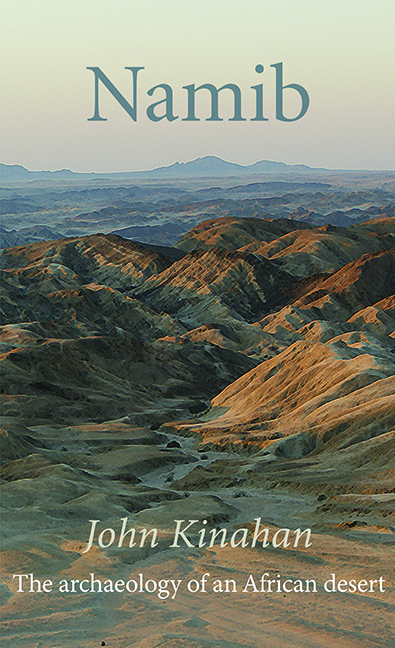Book contents
- Frontmatter
- Contents
- Miscellaneous Frontmatter
- Map
- Dedication
- Preface
- Acknowledgements
- Notes to the Reader
- List of Abbreviations
- List of Figures and Tables
- 1 Introduction
- 2 First Footsteps
- 3 Time’s Arrow
- 4 Mountain Refuge
- 5 Elephants and Rain
- 6 Desert Garden
- 7 The Family Herd
- 8 The Black Swan
- 9 Men in Hats
- 10 The Death of Memory
- Epilogue
- Glossary
- Bibliography
- Index
- Frontmatter
- Contents
- Miscellaneous Frontmatter
- Map
- Dedication
- Preface
- Acknowledgements
- Notes to the Reader
- List of Abbreviations
- List of Figures and Tables
- 1 Introduction
- 2 First Footsteps
- 3 Time’s Arrow
- 4 Mountain Refuge
- 5 Elephants and Rain
- 6 Desert Garden
- 7 The Family Herd
- 8 The Black Swan
- 9 Men in Hats
- 10 The Death of Memory
- Epilogue
- Glossary
- Bibliography
- Index
Summary
Imagine the surprise and consternation of a Namib Desert pastoralist seeing for the first time a sailing ship at anchor, and the strange figures clambering about in its spider's web of rigging. How might he describe this sight in his village beyond the dunes; what was to be done if these strangers came ashore? Unexpected events are as common today as at any time in the human past, but they simply reflect the limitations of human experience; we are apt to generalize and identify trends, not to rationalize the unexpected. Small deviations from the norm are easily accommodated but something completely outside the bounds of knowledge has a different significance, and may have profound consequences. Such phenomena are met initially with surprise but this is soon overtaken by the human propensity to construe even something entirely new in terms of what we already know, and this is how we make sense of the unexpected. Our hypothetical first arrival of a sailing ship on the desert coast exemplifies what is sometimes known as a Black Swan.
Pastoralists are extremely risk-averse, and we have seen in the last chapter how a complex of measures ranging from settlement and marriage patterns, to livestock loans and customary restrictions over access to pastures, all combine to ensure the highest possible degree of stability in an inherently unstable and unpredictable environment. Over time, the lessons of past events are rendered and refined as social customs. But custom is not static, and without constant adjustment it risks redundancy. In previous chapters we saw that ritual, and in the Namib Desert its expression through rock art, played a fundamental role in this mediation between custom, or belief, and contradictory circumstances. In this chapter, we see that pastoral communities on the Namib coast responded to the arrival of European trading vessels by absorbing the visitors into their world, controlling the supply of livestock, limiting access to the interior, and taking the same precautions as they would against a raiding party of their own people.
On the south-western coast of Africa, trading contact between indigenous nomadic pastoralists and European merchant vessels became increasingly common towards the end of the 17th century.
- Type
- Chapter
- Information
- NamibThe Archaeology of an African Desert, pp. 313 - 350Publisher: Boydell & BrewerPrint publication year: 2022



